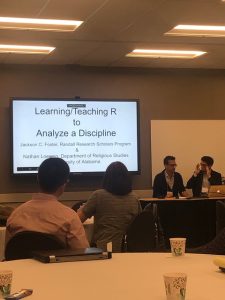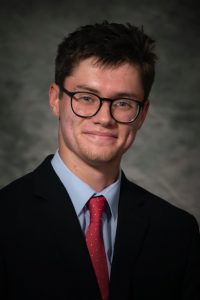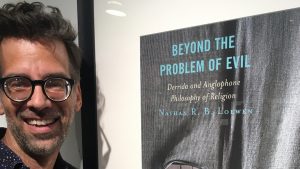
Humanities is an increasingly technology-intensive field, but not typically within religious studies.
What happens when some of the questions about the field cannot be answered with human effort alone?
Enter artificial intelligence, or AI, technology that will boldly take religious studies where it hasn’t gone before. And, at the helm, is a University of Alabama assistant professor and a UA sophomore.
“I wrote a book, ‘Beyond the Problem of Evil,’ last year about the unexplored areas in the philosophy of religion,” said Dr. Nathan Loewen, UA assistant professor of religious studies. “We haven’t looked sufficiently beyond God-questions. So, I’m working with a computer science honor undergraduate student to do a project where we use computational methods to analyze an entire field of scholarly work.”
The project
Loewen is working with Jackson Foster of Fort Lauderdale, Florida. Foster is majoring in history and religious studies, but, as a Blount Scholar and Randall Research Scholars Program honor student, has extensive training in computer science.
The duo met after Foster took a religious studies course with Dr. Mike Altman and told him he was interested in the field. After discovering Foster had a background in computer science, Altman connected him to Loewen, who was trying to use technology to discover oversights in religious philosophy.
“Just having an undergrad computer science person and a humanities professor working together, though not new — because it happens at MIT, Harvard and Stanford — is really interesting,” Loewen said. “For it to be happening in the SEC, I think, is a really big deal.”
Foster enrolled in an independent study with Loewen and, together, they’ve created an approach that uses computational data science tools – AI algorithms that they created and trained — to examine religious studies journals from the past 80 years in hopes of discovering overlooked points, and to quantitatively test arguments Loewen made in his book.
“We’re using computational data science tools usually reserved for social media analysts who predict, for example, what kind of things people buy on Amazon,” Loewen said. “What we’re interested in when looking at the entire field of religious studies is where are the gigantic gaping holes that we can quantitatively look at.”
Loewen said a computer can read 21,000 journal issues in a day. It would take him the remainder of his life to accomplish the same.
The hard grind of training an AI
Foster said one of his largest contributions has been training Loewen in the computer languages of algorithms.

“All the things that I didn’t do in university — calculus, statistics, advanced mathematics, economics – I’m having to do now,” Loewen said, laughing.
“How difficult is it to build an AI by someone who doesn’t have a background in it? I’ve almost cried several times.”
After overcoming Loewen’s unfamiliarity with computer languages, the pair began the grind of accomplishing the first part of their vision: creating and training their experimental model.
“We did a lot of dry runs to learn techniques to understand the limitations and the possibilities within the data itself,” Foster said.
In training the AI, they would give it tasks to see if it could learn the answer on its own.
It doesn’t have a name because it’s not “alive enough yet” to give it one, Loewen said.
Digging deep
Loewen said the project is possible only because much of the literature of religions has been made digital. They were able to access hundreds of digital books by using the journal database JSTOR.
“The data we’re looking at are journals from 1920 to present, and looking at all that print material using the AI to run algorithms on it to find out what topics in that data are being discussed,” he said. “We can also figure out the various authors who are the most influential in the field and where an idea came from, where it went and how it was built on.
“Our interest is tracing those paths, but we’re most interested in knowing what people stopped talking about, and that could tell us the areas for research that haven’t happened yet. What things do we think we’ve done, but we actually haven’t finished yet, as a scholarly discipline?”
Final destination
At the project’s culmination, the two hope to have created something that can demonstrate that computer science and technology can be applied to humanities to produce new and exciting avenues of inquiry and interests.
“Even if we simply use computational studies and big data to just prove what everyone’s said so far is correct, that’s actually an advancement,” Loewen said. “Validation of historical findings is a really important scholarly endeavor also.
“So, those are two things: applying these methods to a field that no one has done before, and perhaps simply validating what people have already done. But, my hunch is that we’re going to find gaps, and it’s going to be exciting to know what those gaps are.”

One accomplishment is that the UA religious studies graduate program will include more computational humanities.
“In the fall, I’m going to teach the basics of what I learned this summer in a course called REL 502, Public Humanities Foundations.”
Loewen said UA’s religious studies department is likely the only one in the U.S. teaching its students this skillset.
“Our students will walk out with digital training that few will have in the field of religious studies. With this, our department hopes to influence the field of religious studies going forward.”
The two presented their preliminary results at the UA Libraries Digitorium in October, and, in November, presented to the Artificial Intelligence and Religion seminar at the American Academy of Religion Meetings conference in San Diego. Loewen is applying for grants to expand the project, and Foster already won a $1,000 UCRA grant from UA’s College of Arts and Sciences for data-mining training at Northeastern University in the summer of 2020.
Their next goal is to scale their project into an open, online resource for use with other humanities datasets.
